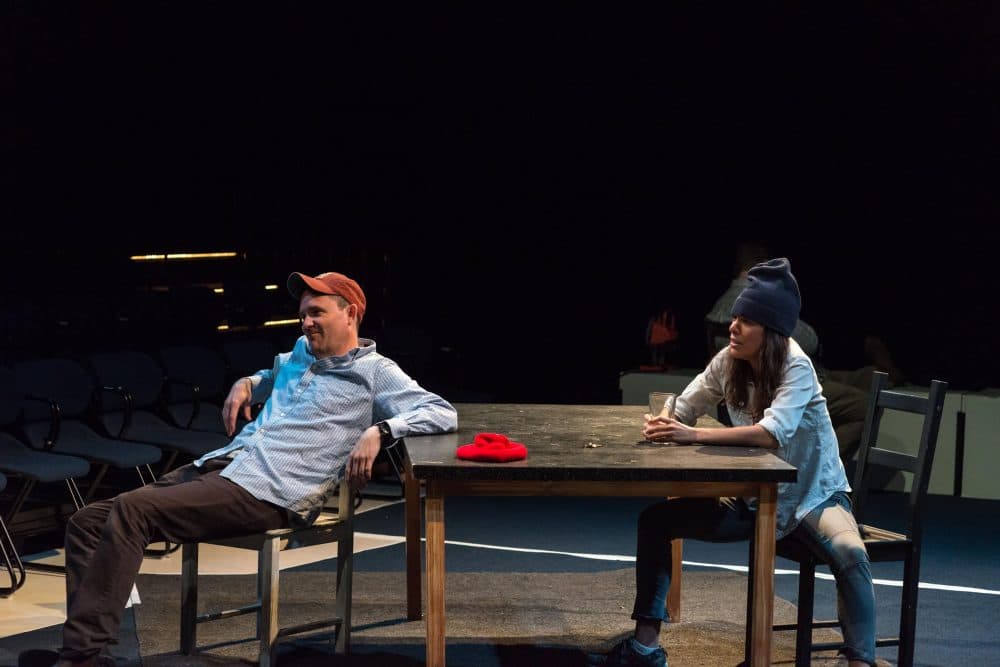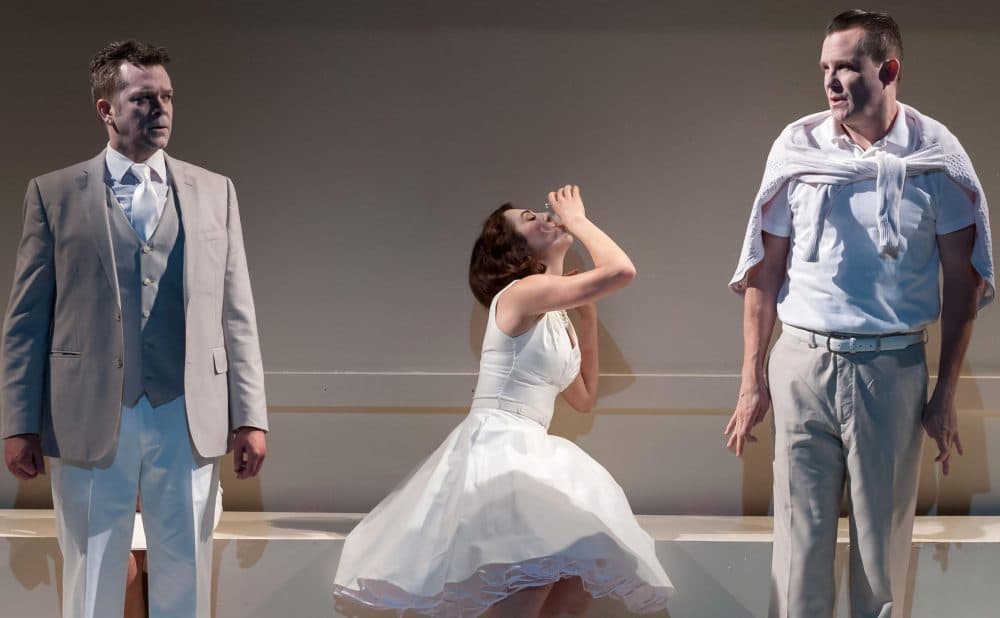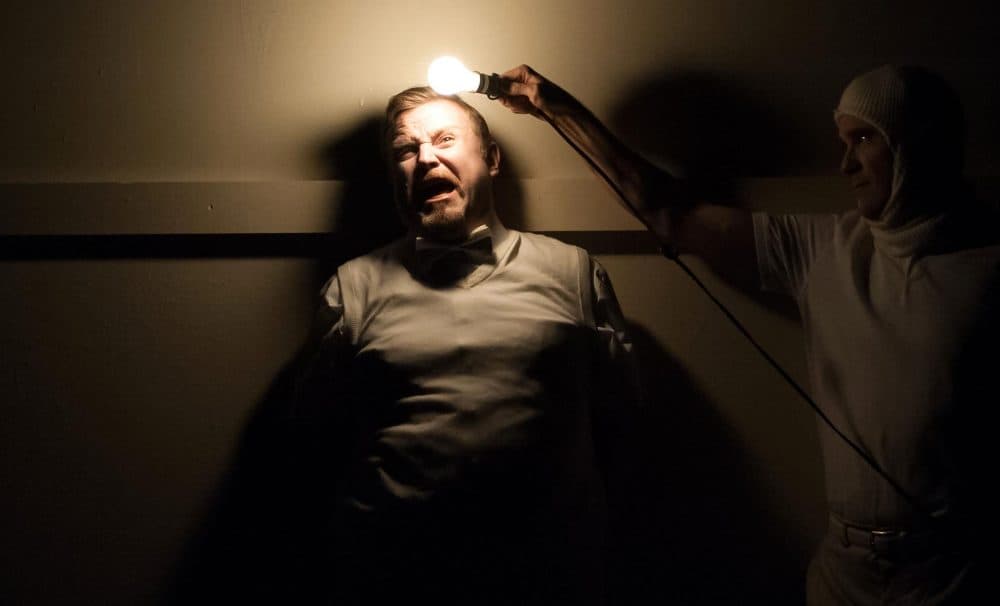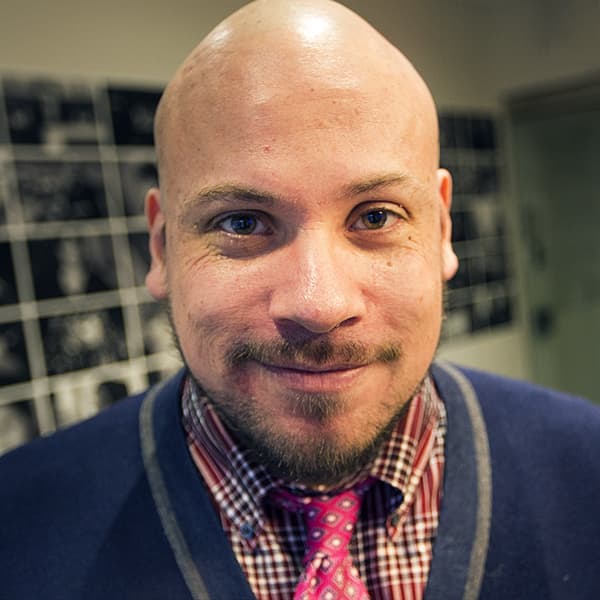Advertisement
What Twin Visions Of Shakespeare's 'Twelfth Night' Say About Possibilities Of Theater
Resume
It’s not unusual for the same theater troupe to alternate performances of two different Shakespeare plays. But the New York-based company Bedlam is putting a very different spin on the repertory concept, performing two entirely different versions of the comedy classic “Twelfth Night” at Central Square Theater in Cambridge. The twin productions offer an object lesson in how a director and a group of actors can wring different meanings out of the same Shakespeare text.
The words are the same, but the overall effect created by each production is entirely different. One, billed as “Twelfth Night,” is a bare-bones version that emphasizes the famous comedy’s melancholy side. Actors are dressed in street clothes, the chief set piece is a table and lighting effects are minimal. At a few points, actor-director Eric Tucker makes asides about confusing points in the script, addressing cast members by name. (“Nobody gets that joke,” he gently scolds at one point.)

The other production takes the play’s little-used subtitle, “What You Will.” It’s a high-concept vision of “Twelfth Night,” with the cast in all-white costumes, a bunch of red paint getting splattered around and some Billie Holiday recordings mixed in for good measure. It’s more dreamlike, with exaggerated characterizations.
Seen in quick succession (the company performs both versions on Saturdays), the two different interpretations make for an ambitious and unusual experiment. But the concept was born from necessity.
Bedlam has made small-cast interpretations of well-known plays, often performed in repertory, into something of a signature. The troupe was developing “Twelfth Night” at Central Square Theater last year while in town to perform its spin on George Bernard Shaw’s “Saint Joan,” which ended up winning an Elliot Norton Award. The plan was to pair the Shakespeare piece with Clifford Odets’ 1950 play “The Country Girl” for a New York run that was already booked.
But then Bedlam couldn’t get the rights to perform Odets' play. Tucker, Bedlam's co-founder and artistic director, walked into rehearsal at Central Square one day with a surprise announcement.
“It kind of came out of a bit of an emergency situation,” Tucker says, “of just needing another play. I thought, let’s just do it two ways. It would be fun to kind of do it as differently as possible.”
By performing the same play with the same actors in two very different productions, Bedlam highlights for audiences the amount of artistic interpretation that goes into any play.
“With the same text and conveying the same basic story, you can convey something totally different. It’s a totally different theatrical experience,” actor Tom O’Keefe says.
“Twelfth Night” is one of those gender-bending mistaken-identity comedies that Shakespeare perfected. The noblewoman Viola is shipwrecked in a foreign land, disguises herself as a man, secretly falls in love with Duke Orsino, and is sent by Orsino to woo Countess Olivia on his behalf — but the countess, fooled by Viola’s manly disguise, falls in love with her instead. High jinks ensue.

Adding to the distinctive nature of these productions is that the five actors quickly switch among characters onstage, and play different combinations of characters in each production.
"Because we’re doing two different versions, we’re playing different roles and we’re doing it eight times a week, I’ll get out there and start speaking lines and think, oh God, I’ve already said these lines — but I haven't," Tucker says. "You have to stay real super-focused as an actor in it, to stay where you are and not get mixed up. We’re doing the same text each night, but from a different point of view. It’s really hard."
Edmund Lewis plays Malvolio, Olivia’s household steward, in both shows. The lines are the same, but Lewis takes two entirely different approaches to the part. In one, Malvolio is an uptight, sadly put-upon loser. In the other, Lewis comically plays up the character’s famous ego — a man who, as one character puts it, is "sick with self-love."
When Malvolio eventually realizes he’s been made a fool of, Lewis’ first interpretation leads us to empathize with the poor sad-sack. With the other, more comic version, the audience is likelier to whoop it up when he gets his comeuppance.
“It’s always interesting for me to hear what people think they hear in each version,” Lewis says, seated with some of the cast in a greenroom after demonstrating the two ways he performs one of Malvolio’s speeches.
“The first Malvolio that I did is just kind of that guy that was never really the winner, and he’s kind of been quietly in love with this woman that he’s protected and worked for, for years. [The other] is… taken to almost impressionist extremes, where it’s just ridiculously effete and exaggerated and florid. So it’s just two very different guys, but at heart both guys are in some strange way coming from a similar place of very deep insecurity.”

Maybe “Twelfth Night” is particularly ripe for this dual treatment. Despite its obvious humor, the play confronts the reality that joy and sadness are intertwined — that melancholy can feel good, and happiness can hurt.
“These plays are often played very funny, very ridiculous-funny, and they are funny. [But] everyone’s looking for someone, everyone’s in love with the wrong person, people are lonely, it’s sad, there’s death, like, all over the place,” O’Keefe says.
Fellow cast member Kelley Curran says the experience of seeing both shows may reveal something to audiences about the very nature of theater.
“I hope it, like, helps people understand just sort of the extraordinary range of things that can happen in one space, if you just put one different lens on it or one different filter,” she says.
Shakespeare is open to wide interpretation. There are few stage directions or instructions about sets or costumes; directors and actors have creative license to find different meanings in the same text. And Bedlam theater wants to explore these differences further with more experiments to come, like staging two versions of “Julius Caesar,” with all-male and all-female casts.
Curran says these kinds of approaches to The Bard, including the two visions of “Twelfth Night,” can be as instructive for actors as for their audiences.
“It’s infinite, the choices you can make to support his language. There are just so many, and so many possibilities," she says. "There’s a lot of fun in that. And there’s a lot of fun in getting to do that in front of an audience that chooses to come along with you for the whole journey.”
Bedlam performs "Twelfth Night" and "What You Will" in repertory at Central Square Theater through July 10, presented by the Nora Theatre Company.
This segment aired on June 24, 2016.
